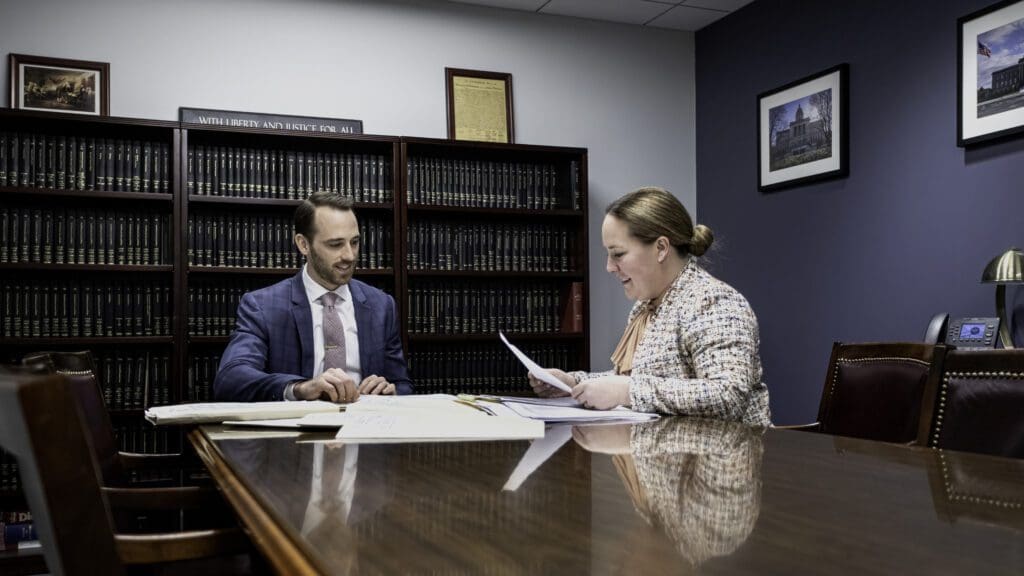- Criminal Defense
- Appeals Attorney
Your New York State
Appeal Attorneys
A criminal conviction can have a catastrophic lifetime impact. Cambareri & Brenneck, your criminal defense team, can help.
Message Your Team
Experienced Appellate Attorneys
Trust former prosecutors to handle your appeals case.

Can I Appeal My Case?
Consulting with an attorney who has extensive experience in New York appeals is crucial to determine the viability of an appeal. In many instances, you have the right to appeal your case if you believe there were legal errors that affected the outcome. Whether you can appeal depends on the specifics of your case, including the nature of the decision and the court that issued it.
What is a Notice of Appeal?
An appeal begins by filing a notice of appeal with the court that issued the decision.
Explore your legal options with an experienced and knowledgeable former prosecutor before a plea deal is entered. We take all situations into consideration to get you the best results.
What is an Appeal?
An appeal is essentially asking a higher court to review a decision made by a lower court. There are many ways to do that. Consulting with an attorney who has extensive experience in New York appeals is crucial to helping you navigate that situation.
At Cambareri & Brenneck we
regularly examine whether or not:
There have been rights violations against our client.
Violation of search and seizure laws.
There are misconduct issues.
There are pieces of evidence that should be suppressed.
There have been chain-of-evidence issues.
There are witnesses (or other evidence) that dispute the state's version of events.
What's the Appeal Process?
The appeal process typically involves several stages, including filing a notice of appeal, preparing an appellate brief, and sometimes, presenting oral arguments before the appellate court. The court will then review the case, focusing on potential legal errors rather than factual disputes. It’s essential to have a knowledgeable attorney guide you through this process, ensuring each step is handled diligently.
Appeals Remedies Include
Verdict Gets Vacated
Sentencing Gets Modified
Post-Conviction Motions Granted

Understanding Appeals in New York
The most common appeal types:
Trial Appeal
A trial appeal refers to the process of appealing a criminal conviction or sentence based on errors or irregularities that occurred during the trial. The appellant (the party appealing) argues that the trial court made legal mistakes that affected the outcome of the case, such as incorrect jury instructions, the admission of improper evidence, or violations of the defendant’s constitutional rights. The purpose of a trial appeal is to have a higher court review the trial proceedings and potentially reverse or modify the original decision.
Guilty Plea Appeal
A guilty plea appeal occurs when a defendant appeals their own guilty plea. The appellant argues that their plea was not knowingly, voluntarily, or intelligently made, often claiming that they were coerced, misled, or did not fully understand the consequences of the plea. The purpose of a voluntary plea appeal is to have the plea withdrawn or the case reopened for further proceedings.
440 & 330 Motions
In some jurisdictions, a 440 motion or a 330 motion is a legal mechanism for a defendant to challenge their conviction or sentence. A 440 motion typically allows a defendant to raise newly discovered evidence, ineffective assistance of counsel, or constitutional violations that were not raised during the trial or on direct appeal. A 330 motion, on the other hand, is specific to New York State and provides a means for a defendant to challenge the legality of their sentence.
Coram Nobis
Coram nobis is a Latin term that translates to “before us” in English. It is a legal remedy that allows a defendant who has already been convicted and exhausted their direct appeals to bring a new challenge based on fundamental errors that occurred during the proceedings. The coram nobis petition typically argues that there was a significant error that was not known or could not have been raised at the time of the original trial or appeal, such as ineffective assistance of counsel or newly discovered evidence.
Article 78
Article 78 refers to a specific provision in the New York Civil Practice Law and Rules. It is not directly related to criminal appeals but can be relevant in certain cases involving government actions. Article 78 proceedings are used to challenge the decisions or actions of government agencies or officials when they are believed to be arbitrary, capricious, or contrary to the law. While it is not specific to criminal appeals, it can be utilized in criminal cases when challenging administrative decisions, such as parole denials or disciplinary actions.
Sealing & Expungement
Sealing and expungement are legal processes that allow individuals to limit or remove records of their criminal history from public view. Sealing generally means that the records are still accessible but are restricted to certain parties, such as law enforcement and criminal justice agencies. Expungement, on the other hand, involves the complete erasure of the records as if they never existed. The eligibility and procedures for sealing and expungement vary by jurisdiction, and not all convictions or offenses may be eligible for these remedies.
Ineffective Assistance of Counsel
Ineffective assistance of counsel is a constitutional claim that can be raised on appeal. It asserts that a defendant’s defense attorney provided inadequate representation, which deprived the defendant of their constitutional right to effective assistance of counsel. To succeed with this claim, the defendant typically needs to show that their attorney’s performance fell below an objective standard of reasonableness and that this deficient performance prejudiced the defendant’s case, meaning it had a significant impact on the outcome of the trial or sentencing.











